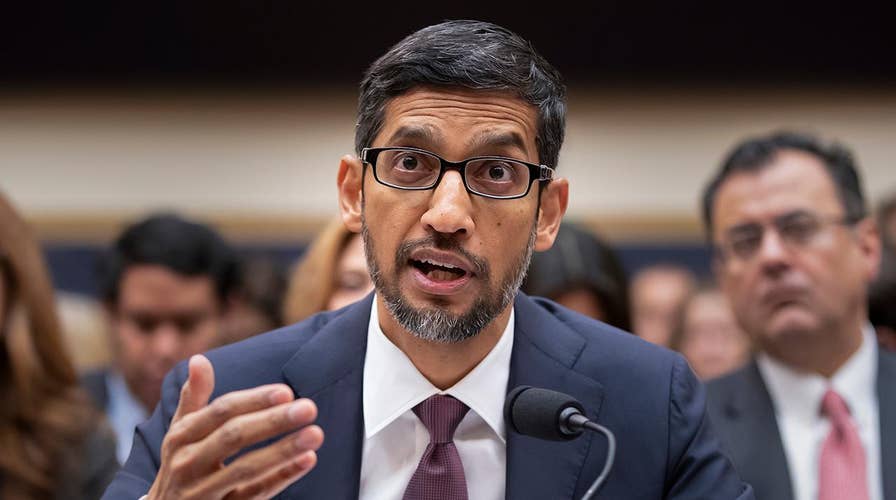Google CEO Pichai grilled by House lawmakers on Capitol Hill
Members of the House Judiciary Committee peppered the head of Google about potential bias against conservatives and Russian influence and misinformation; Gillian Turner reports.
Everyone involved in politics has bad days, when one’s interests conflict with one’s ideals. Some conservatives had a bad day on Tuesday when Google CEO Sundar Pachai appeared before Congress to respond to allegations of anti-conservative bias at Google.
Since at least the presidency of Ronald Reagan, conservatives have stood for limited, constitutional government. That commitment has not always been easy. Supreme Court Justice Antonin Scalia voted to protect flag burning as free speech even though he hated the desecration of the flag. If conservatives don’t stand strong – even in tough cases – for limited government, who will?
Content moderation at big tech companies certainly looks like a tough case. On the one hand, conservatives have long supported a free market where entrepreneurs and CEOs, not politicians, decide how to run businesses.
On the other hand, Mark Zuckerberg, noted earlier this year that the people who work in Silicon Valley generally lean to the left. So do university employees, and conservatives are well aware of the problems posed by the left’s dominance on campuses.
So conservatives are tempted to use the tools of big government to make sure Google and Facebook don’t restrict speech that their employees do not like. We saw some conservatives giving in to temptation during the Pachai hearings.
Rep. Mike Johnson, R-La., said Congress should make sure Google’s search “is never used to unfairly censor conservative viewpoints or suppress political views.” I thought the Fairness Doctrine was done away with during the Reagan administration because that conservative president believed in free speech! The conservative ideal of the free market in searches and speech means Mr. Pachai is accountable to his customers – not to Congress.
Rep. Steve King, R.-Iowa, demanded that Congress have access to the social media history of content moderators at Google. He continued, “If that doesn’t solve this problem, the next step then is to publish the algorithms. If that doesn’t happen, then the next step down the line is Section 230.” (Section 230 of the Communications Decency Act provides liability protections which prevent social media firms from being held legally responsible for user-generated content.)
Let’s be clear here. Rep. King is saying the federal government should force private individuals to disclose their life online to achieve “fairness.” If that fails, the federal government should take control of private property (the code for Google’s search function) and make it public, thereby destroying much of its value. Finally, if all else fails, Rep. King wants to end that part of current law (Section 230) which experts say has protected speech from suppression by big tech.
No doubt Reps. King and Johnson give voice to conservatives' fears. Having been excluded from the mainstream media and university campuses, conservatives now see a future of being forced off the online platforms where most political speech takes place.
But big government is not the answer. As early as 2021, liberals may control both houses of Congress and the presidency. Are they likely to use the federal government to make sure companies are fair to conservatives? Of course not. So why give the federal government such new power over private companies?
Conservative ideals can still protect conservative interests. At least half of America leans right, a market that Mr. Pachai and other Silicon Valley CEOs will not ignore, whatever their own political commitments. And if some Google employees decide that politics matter more than profits, it is Mr. Pachai’s responsibility, not Congress’, to set matters right on behalf of his shareholders.
Humans are often tempted to sacrifice their ideals for good reasons and bad. But a market free of government control was a worthy ideal long before Google arose. Indeed, that ideal made Silicon Valley possible.
Conservatives need to stay the course and reject the temptation of big government regulation of the internet – a temptation that in the end will serve neither their ideals nor their interests.





















